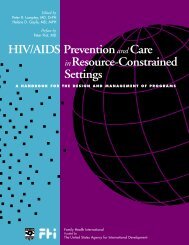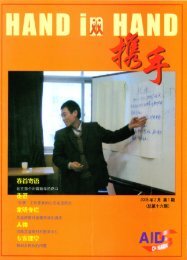The Training of Trainers Manual - UNFPA
The Training of Trainers Manual - UNFPA
The Training of Trainers Manual - UNFPA
You also want an ePaper? Increase the reach of your titles
YUMPU automatically turns print PDFs into web optimized ePapers that Google loves.
Handout 11 • Incentives for Peer Educators 11<br />
Incentives are things that bring about action. In peer education, incentives can help attract peer<br />
educators into a program and keep them motivated and interested in their work. Incentives can range<br />
from fairly costly to inexpensive. <strong>The</strong> following list <strong>of</strong> incentives was developed during brainstorming<br />
sessions held with Y-PEER Focal Points in Ochrid, Macedonia, in August 2004.<br />
Higher cost<br />
■ Offer large quantities <strong>of</strong> high-quality or high-tech educational materials (electronic resources,<br />
T-shirts, notebooks, manuals)<br />
■ Sponsor attendance to conferences, meetings, or presentations that occur at the regional or<br />
international level<br />
■ Provide internships, scholarships, or job opportunities at organizations<br />
■ Invite peer educators to represent their organization at national and regional events<br />
■ Hold contests with generous prizes (such as travel or a computer)<br />
■ Sponsor a formal reception for all people involved with peer education (peer educators, trainers,<br />
staff, partners, donors)<br />
■ Provide administrative, technical equipment (computers, photocopies, s<strong>of</strong>tware)<br />
■ Offer a salary<br />
Lower cost<br />
■ Provide no- or low-cost access to administrative, technical equipment for peer educators<br />
(computers, fax, phones, internet)<br />
■ Find ways to make use <strong>of</strong> peer educators’ creativity by letting them write and design a<br />
newsletter, website, or promotional materials<br />
■ Conduct regular monitoring visits so peer educators know supervisors are interested<br />
in their work<br />
■ Invite senior staff from non-governmental organizations (NGOs), donors, and partners to<br />
observe work at the field level<br />
■ Provide access to low-cost basic health services (family planning, counselling, and commodities<br />
such as pills or condoms)<br />
■ Continue training by providing short refresher courses or introducing new technical information<br />
■ Provide access to additional reference or resource materials<br />
■ Pay small sums <strong>of</strong> money to peer educators, such as a per diem for work days<br />
■ Provide money for local transportation or provide bicycles<br />
■ Give some promotional materials (t-shirts, pens, pamphlets)<br />
Little or no cost<br />
■ Ask peer educators for their ideas and listen to what they have to say<br />
■ Provide verbal recognition <strong>of</strong> good work or successful completion <strong>of</strong> assignments (one-on-one,<br />
in meetings, or at events)<br />
■ Give awards (such as ‘peer <strong>of</strong> the month’)<br />
■ Finish some meetings with a ‘fun’ session with refreshments (this could also mean having a<br />
meeting and providing lunch or snacks after)<br />
■ Invite peers to present their work or knowledge at higher-level meetings or workshops<br />
■ Invite peers to attend regular staff meetings to learn more about the project<br />
Section 4. Participant Handouts<br />
153

















